Signs of the Times • 13 December 2019 • No. 203
¶ Processional. This young drummer, Silas, is a member of Jesus the Redeemer Church in Kapenguria, Kenya, accompanying a praise song, “Sing With Joy, Jehovah Has Given Us Eternal Life.” (Thanks Boaz.)
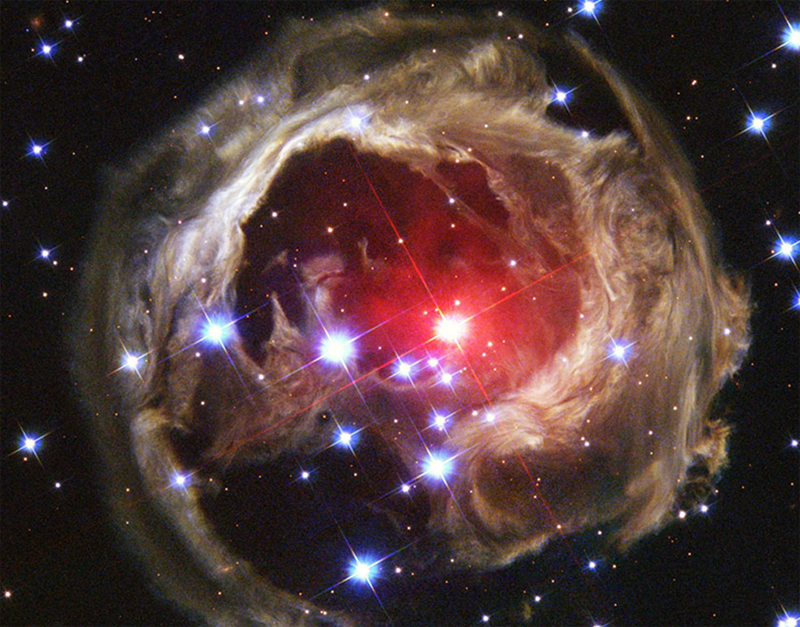
Every year NASA produces a Hubble Space Telescope Advent Calendar. Pictured above: Spirals of dust swirl across trillions of kilometers of interstellar space as an expanding halo of light around a distant star, named V838 Monocerotis illuminates the giant cloud. The glow comes from the red supergiant star at the middle of the image, which gave off a flashbulb-like pulse of light, This image shows the progress the light-pulse had made after two years of traveling away from the star in all directions, imaged by Hubble on February 8, 2004. V838 Monocerotis is located about 20,000 light-years away from Earth in the direction of the constellation Monoceros, at the outer edge of our Milky Way galaxy.
¶ Invocation. “Secure the lamb, the wolf no longer preys / Secure the child, no fear displays / The vow of vengeance bound evermore / God’s holy mountain safe and adored / Rejoice! Rejoice! Emmanuel / Shall come to thee, O Israel!” —new lyrics to “O Come, O Come, Emmanuel”
¶ Call to worship. “Silent Night,” sung in Beirut, Lebanon, by a young Muslim women’s choir in Arabic. (Thanks Loren.)
Remembering Joseph
A friend in Italy recently sent a remarkable 15th century icon of the Nativity (pictured at right). It would be ![]() uncommon, even in 21st century terms, because of its gender-bending depiction of the Holy Family.
uncommon, even in 21st century terms, because of its gender-bending depiction of the Holy Family.
Mary is shown reading Torah; Joseph is on the ground cuddling baby Jesus.
It makes me wonder if the artist (traditional iconographers did their work anonymously) was influenced by the Beguines, semi-monastic communities (initially in the Low Countries of Europe) of single women, beginning in the 12th century, who served the poor and marginalized, yet took no formal religious vows. Initially recognized by church authorities, their growing presence outside of male authorities, along with their theological creativity, led to repression.
I have long been especially curious about Joseph. Mary is obviously at the center of the story of Jesus’ birth. It’s true that she “submits” to the entreaty of the angel; but her submission is the stuff of revolt against the entrenched social order. Her surrender is an active collaboration; and, to every Herod—then and now—a national security threat.
Joseph, on the other hand, has a minor part in the story, and his presence on the stage is fleeting.
His reaction to Mary’s surprise pregnancy is magnanimous. The text says that he refused to publicly shame Mary for this cockamamie story of divine procreation. And then, planning to “dismiss her quietly” (Matthew 1:19), he reverses course and follows the angel’s dream time instruction to wed Mary. Then, after another dream, he guides Mary and baby Jesus through the desert as refugees from Herod’s rage, taking shelter in Egypt. After yet another dream, he brings the family back to Palestine, this time to Nazareth, north of Rome’s closely guarded grip.
After that, except for an indirect suggestion of his presence with Mary for Jesus’ post-natal “purification” ritual (Luke 2:22), he disappears from history. Though not, since then, in the imagination of shipwrecked sailors and abandoned children, for whom he is a patron saint.
Below is a poem inspired by his thin but intriguing storyline. (See also “Joseph,” a litany for worship drawn from the poem below, inspired by the Matthew 1:18-25.)
§ § §
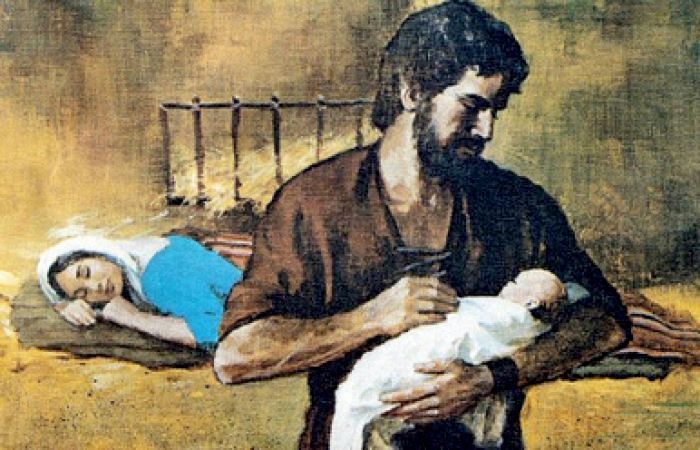 Joseph
Joseph
Made redundant by the very breath of God.
What became of you?
Obedient to heaven’s outrageous instructions
amid Caesar’s assessment.
Unable to provide more than squalid accommodation
in your beloved’s night of travail.
Enduring embarrassed encounters
with wild-eyed shepherds and
strangely-clothed pilgrims
from obscure and distant lands,
each with incredulous stories of starry encounters.
Then hurtling toward Egypt—a land still haunted
by chained voices of ancestral slaves
—only steps ahead of Herod’s rage, the
Ramah-voice of Rachel weeping in the wind.
—continue reading “Joseph”
§ § §
¶ Hymn of praise. “Holy Mary, Mother of God, pray for us sinners, / Holy Mary, pray for us now and in the hour of our death. / Amen. Amen. Amen.” —English translation of final verse of bar room rendition of Biebl’s “Ave Maria,” by Cantus & Chanticleer (Thanks David.)
¶ Confession. “Lord, deliver me. Overnight, free shipping. / Deliver to my doorstep parties and parcels / and carols of merriment but not the pause to look, / not self-awareness, not change, not repentance. / Never mind the child in the night, never mind / the cries beneath the carols, never mind / the ax lying at the root of the trees.” —Steve 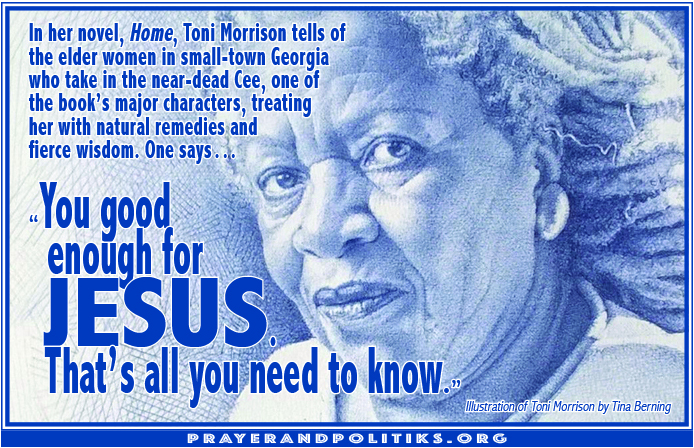 Garnaas-Holmes, “Ax at the root,” Unfolding Light
Garnaas-Holmes, “Ax at the root,” Unfolding Light
¶ Hymn of supplication. “Waiting For You,” an Advent song by The Many.
¶ Good news
• “Close to extinction, this humpback whale population is making comeback.” —Dominic Rech, WMUR
• A court in Michigan “throws a wrench in Nestle’s attempts to privatize water around the country.” —, Guardian
• “India cancels plans for huge coal power stations as solar energy prices hit record low.” —, Independent
• “The European Investment Bank (EIB), the world’s largest international public bank and lending arm of the European Union, adopted a new lending policy that will cut finance to most fossil fuel projects as it tries to become the world’s first ‘climate bank’.” — (Thanks Betsy.)
¶ Words of assurance. “Ode 9 of the Nativity of Christ,” by Archangel Voices. (Thanks Terry.)
¶ Professing our faith. “World leaders are meeting in Spain to decide whether or not to bother with preventing the destruction of the earth, like people in a vehicle speeding toward a cliff deciding whether to brake or swerve or just chat about other things. Powerful senior citizens in the United States – Trump, Giuliani, Biden – are trading playground insults, and the middle-aged people who make a lot of decisions about how to handle this emergency seem incapable of thinking beyond the singularly imagination-killing criterion of short-term profit. . . .
“There have been farsighted altruistic people in every generation, but there are signs of a wider evolution of imagination that is taking place among the young. We see that profound change in new ways of dealing with 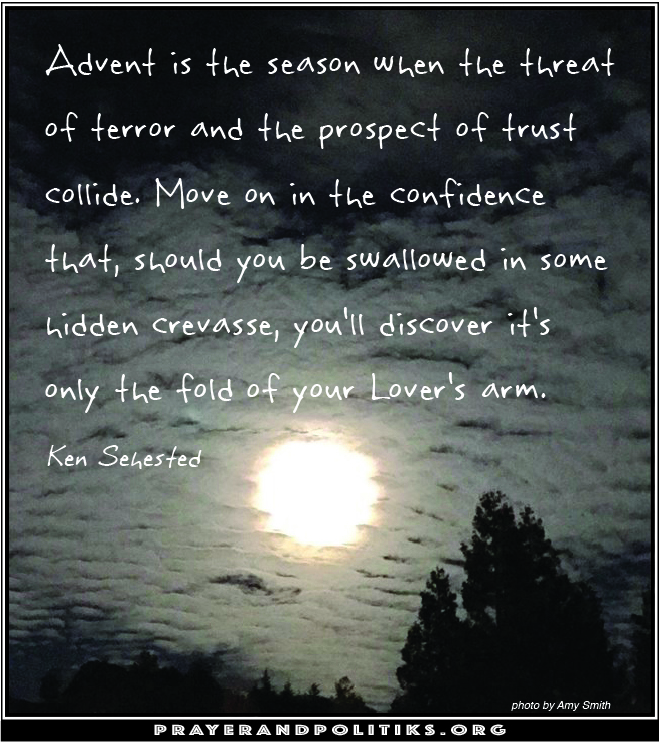 conflict, with rejecting competition and capitalism, new understandings of what is possible and ethical. We see the children are mature and too many old people are juvenile. Juvenility and maturity are no longer categories attached to how long you’ve been on Earth, but how far you see and how much you care.” —Rebecca Solnit, “,” Guardian
conflict, with rejecting competition and capitalism, new understandings of what is possible and ethical. We see the children are mature and too many old people are juvenile. Juvenility and maturity are no longer categories attached to how long you’ve been on Earth, but how far you see and how much you care.” —Rebecca Solnit, “,” Guardian
¶ Word. “People talk about caterpillars becoming butterflies as though they just go into a cocoon, slap on wings, and are good to go. Caterpillars have to dissolve into a disgusting pile of goo to become butterflies. So if you’re a mess wrapped up in blankets right now, keep going.” —Jennifer Wright
¶ Satire alert. “Evangelicals breaking up with Jesus,” by Mrs. Betty Bowers, Americans Best Christian.
¶ Preach it. “When is the time for love to be born? / The inn is full on the planet earth, / And by a comet the sky is torn— / Yet Love still takes the risk of birth.” —excerpt from “The Risk of Birth,” Madeleine L’Engle
¶ Can’t makes this sh*t up.
• The Walmart store in Canton, Ohio, sponsored a Thanksgiving holiday canned goods drive for its own employees! (According to a National Employment Law Project report, Walmart is the lowest-paying large company in the US.) —, Forbes (Thanks Brian.)
• President Trump’s commentary on the looming water crisis. (56 second video.)
• The US Border Patrol has purchases 33,000,000 rounds of ammunition for its new Glock handguns. —Bloomberg
¶ Call to the table. “So the christians and the pagans sat together at the table, / Finding faith and common ground the best that they were able, / And just before the meal was served, hands were held and prayers were said, / Sending hope for peace on earth to all their gods and goddesses.” —Dar Williams, "The Christians and the Pagans"
¶ Helpful tools: Recommended podcast on Le Chambon & Andre Trocme
A few communions have on their liturgical calendars the 28 December “Feast of the Holy Innocents,” to 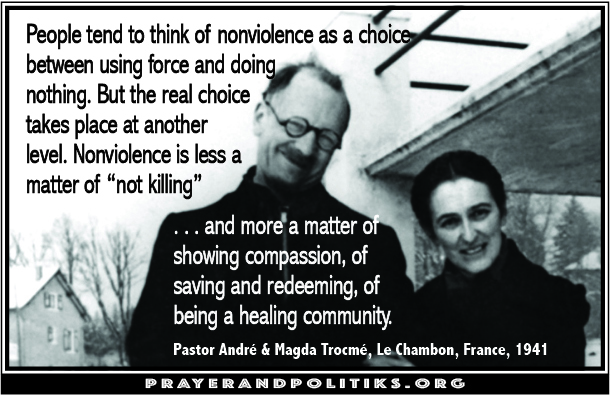 recollect the trauma of King Herod’s order to kill all the infants around Bethlehem in response to the magis’ announcement. (See Matthew 2:1-18. This story ought to be told every year, as a reminder that the Good News isn’t welcomed by those with a stake in the way things are.)
recollect the trauma of King Herod’s order to kill all the infants around Bethlehem in response to the magis’ announcement. (See Matthew 2:1-18. This story ought to be told every year, as a reminder that the Good News isn’t welcomed by those with a stake in the way things are.)
“Waging Nonviolence,” a resource I consult frequently, is producing a 10-part podcast devoted to telling the story of the village of Le Chambon sur Lignon in southeastern France, which is credited with saving the lives of some 5,000 Jews during World War II. (Five episodes, each 30-40 minutes long, are already available, with five more to be released in the coming weeks.)
At the center of this amazing story was André Trocmé, pastor of the Protestant congregation in Le Chambon, and his wife Magda. You may already know Philip Hallie’s book, “Lest Innocent Blood Be Shed: The Story of the Village of Le Chambon and How Goodness Happened There,” which first accounted this narrative to a broad audience.
I recommend this series both for personal enrichment and for small group discussion as a means of shedding new light on the observance of the Feast of the Holy Innocents.
¶ The state of our disunion.
• Star baseball pitcher Gerrit Cole was hired away from the Houston Astros by the New York Yankees for a record-breaking $324,000,000 nine-year contract. Based on Cole’s statistics from the 2019 season—33 games, 101.9 pitches per game—Cole’s new contract will yield $10,695 per pitch. A worker making the federal minimum hourly wage of $7.25 will work a bit over seven months for what Cole makes for one pitch.
• “U.S. stock market at record but farm bankruptcies at highest since 2011.” —Clive McKeef, Market Watch
• Watching immigrant children being tear-gassed at the US border “was the highlight of my Thanksgiving weekend.” —Fox News Host Tomi Lahren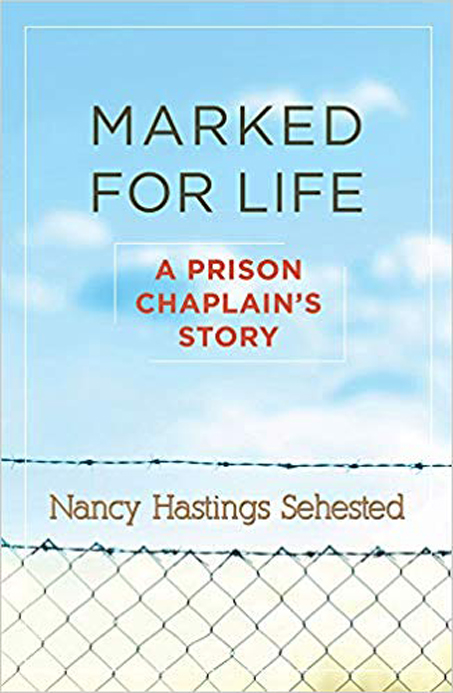
¶ Best one-liner. “The future is in the hands of those people who recognise the other as ‘you’ and themselves as part of an ‘us.’” —Pope Francis
¶ Point of personal privilege. “Long one of our finest preachers, Nancy Hastings Sehested now takes her place as a supremely gifted writer among us. Sehested’s new book [Marked For Life: A Prison Chaplain’s Story] chronicles her 13 years as a chaplain in two men’s prisons in North Carolina, the last 10 in a maximum security facility where she distinguished herself as a sensitive, no-nonsense pastor to inmates, many convicted of particularly brutal crimes. Hers is a no sugar-coated account of life in prisons all too typical in the United States today; their brutality is confronted in gut-wrenching honesty—the brutality of the facilities themselves, that of some prison officers in confrontations with inmates, and that of bloody battles among prisoners themselves. Nor is this the chronicle of a benighted liberal making judgments from some exalted platform. Instead, it is an honest, self-reflective account of a minister who unexpectedly found herself at a crossroads in her pastoral ministry that led her into prison chaplaincy.” —continue reading Stan Hastey’s review of Marked For Life, Orbis Books
¶ Altar call. “The search light in the big yard / Swings round with the gun / And spotlights the snowflakes / Like the dust in the sun / It's Christmas in prison / There'll be music tonight / I'll probably get homesick / I love you. Goodnight.” —John Prine, “Christmas in Prison”
¶ For the beauty of the earth. Watch this brief (0:20) video of a drop of water freezing to form a snow flakes.
¶ Benediction. “Arise, you fear-confounded, attest / With Insurrection’s voice confess / Though death’s confine and terror’s darkest threat / Now govern earth’s refrain . . . and yet / Rejoice! Rejoice! Emmanuel / Shall come to thee, O Israel!” —new lyrics to “O Come, O Come, Emmanuel”
¶ Recessional. “We are Christmas, we are God’s hands / To care for one another in these war torn lands / We are Christmas, the love that we share / Will carry one another ‘til we understand / We are Christmas.” —Spellman College Glee Club, “We Are Christmas”
¶ Just for fun. Allegro, an online auction site, gets the best Christmas commercial award with “English for Beginners.” (2:59 video. Thanks Suzii.)
# # #
Featured this week on prayer&politiks
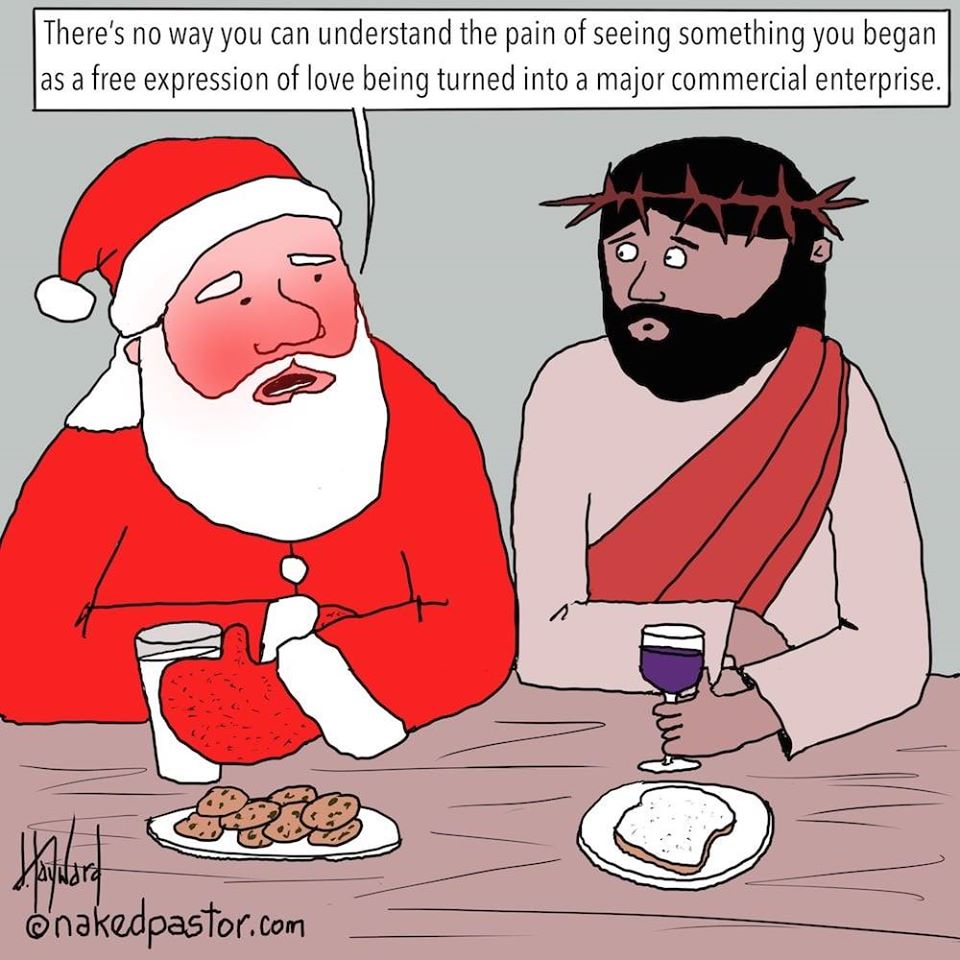 • “‘Peace, like war, is waged’: A personal remembrance of Walker L. Knight, in light of Advent’s threat and promise,” a new essay
• “‘Peace, like war, is waged’: A personal remembrance of Walker L. Knight, in light of Advent’s threat and promise,” a new essay
• “Joseph,” a litany for worship drawn from the poem below, inspired by the Matthew 1:18-25
• “Joseph,” a poem
• New lyrics to “O Come, O Come, Emmanuel”
• More Advent & Christmas resources for worship: Litanies, poems, sermons and new lyrics to old hymns
©Ken Sehested @ prayerandpolitiks.org. Language not otherwise indicated above is that of the editor, as are those portions cited as “kls.” Don’t let the “copyright” notice keep you from circulating material you find here (and elsewhere in this site). Reprint permission is hereby granted in advance for noncommercial purposes.
Feel free to copy and post any original art on this site. (The ones with “prayerandpolitiks.org” at the bottom.) As well as other information you find helpful.
Your comments are always welcomed. If you have news, views, notes or quotes to add to the list above, please do. If you like what you read, pass this along to your friends. You can reach me directly at kensehested@prayerandpolitiks.org.



 pastoral leadership (clergy and lay) refused to move to the suburbs when the neighborhood de-gentrified. It was a risk-your-assets moment, resulting in substantial membership loss. The refusal to comply with Jim Crow almost killed the church. But then came Epiphany’s visionary renewal. Clarity is often reserved for those with their backs against the wall.
pastoral leadership (clergy and lay) refused to move to the suburbs when the neighborhood de-gentrified. It was a risk-your-assets moment, resulting in substantial membership loss. The refusal to comply with Jim Crow almost killed the church. But then came Epiphany’s visionary renewal. Clarity is often reserved for those with their backs against the wall.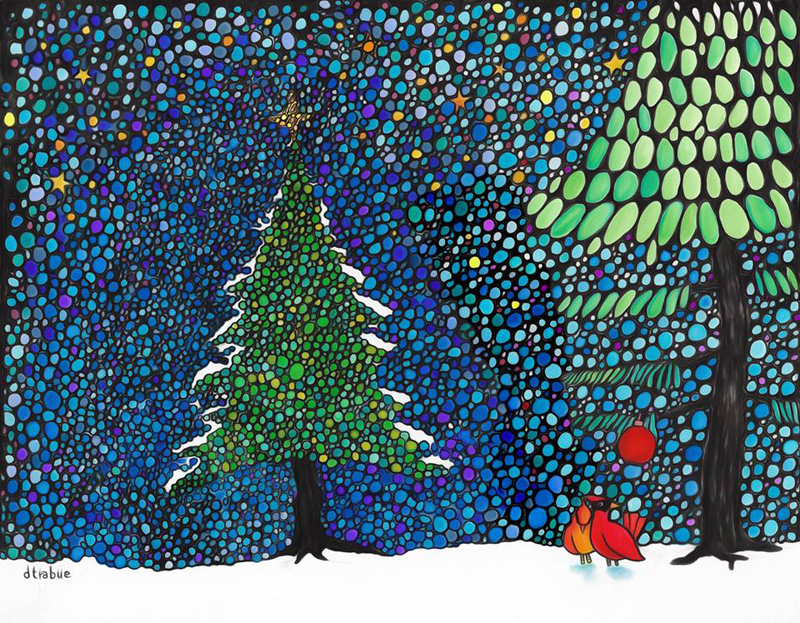
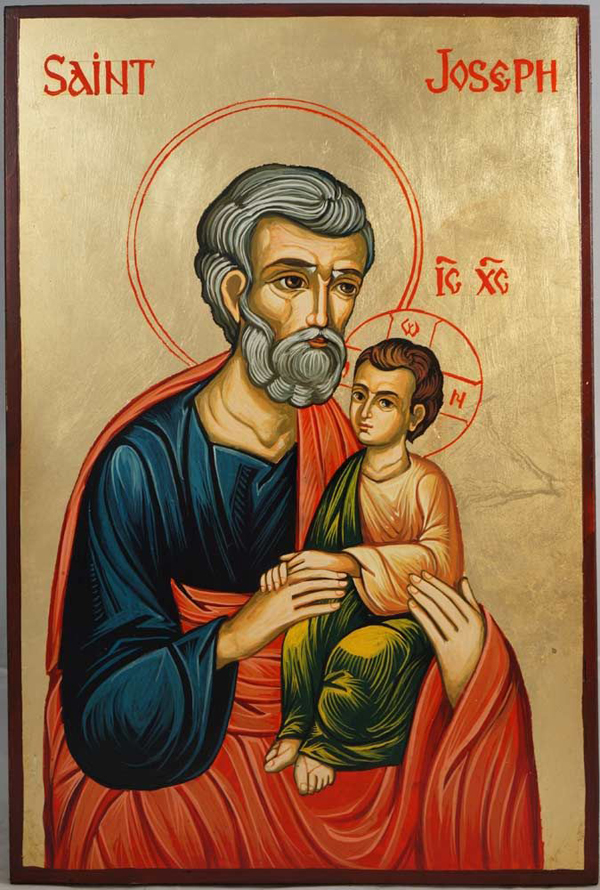 Obscured brother
Obscured brother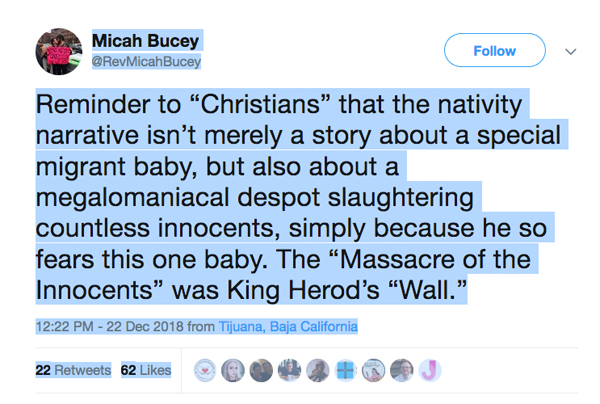 a fate unrecorded, left to the imagination
a fate unrecorded, left to the imagination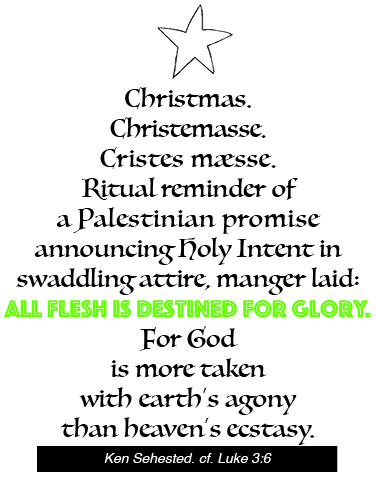 ¶ Already a patron saint of Mexico, Canada and Belgium, in 1870, Joseph was declared patron of the universal church by Pope Pius IX, and in 1955 Pope Pius XII established May 1 as the "Feast of St. Joseph the Worker" to counter the Communists' May Day.
¶ Already a patron saint of Mexico, Canada and Belgium, in 1870, Joseph was declared patron of the universal church by Pope Pius IX, and in 1955 Pope Pius XII established May 1 as the "Feast of St. Joseph the Worker" to counter the Communists' May Day. village of Arnsdorf.” —“
village of Arnsdorf.” —“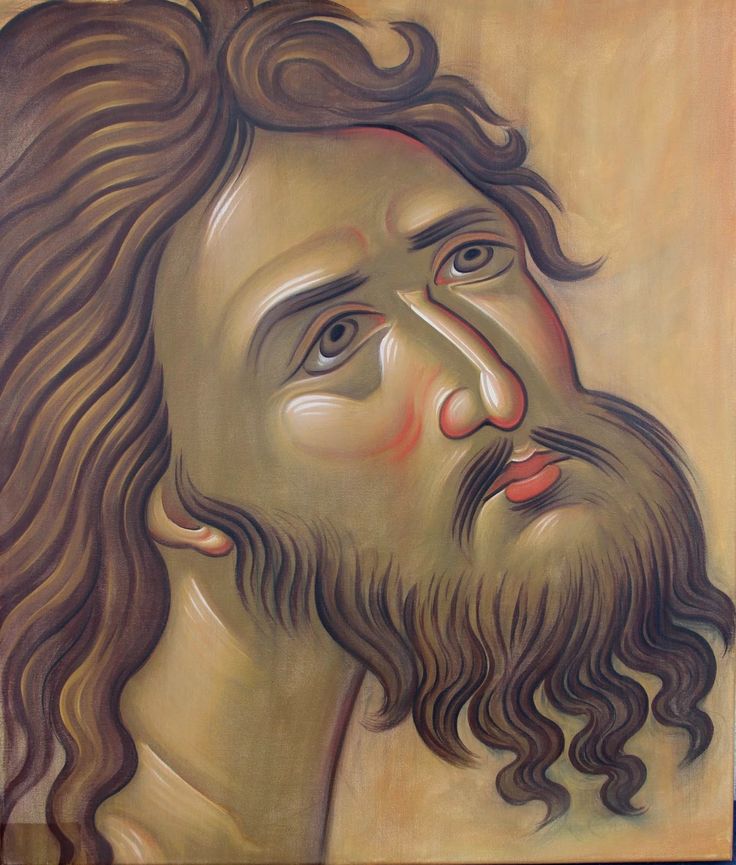 Charge or not?!”
Charge or not?!”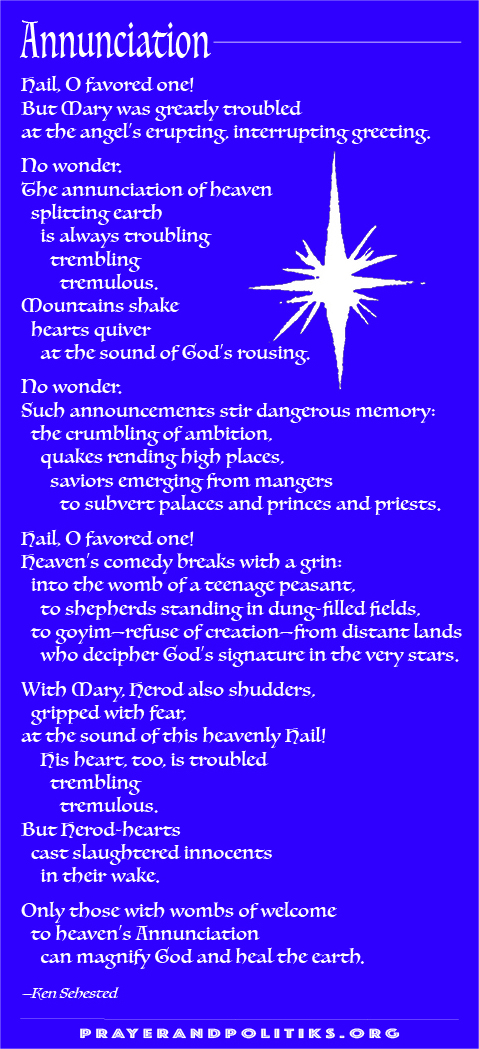 insist on a more assertive, individuated figure to front the Christmas story?
insist on a more assertive, individuated figure to front the Christmas story? political forces—of disaffiliation and cynicism—which tear at our social fabric. Al-Baghdadi incarnates what the Apostle Paul referred to as “principalities and powers,” transpersonal realities which wreak havoc in the Middle East’s body politic and beyond. Such forces cannot be squelched. They cannot be drained or addressed before they are mapped and root causes attended.
political forces—of disaffiliation and cynicism—which tear at our social fabric. Al-Baghdadi incarnates what the Apostle Paul referred to as “principalities and powers,” transpersonal realities which wreak havoc in the Middle East’s body politic and beyond. Such forces cannot be squelched. They cannot be drained or addressed before they are mapped and root causes attended.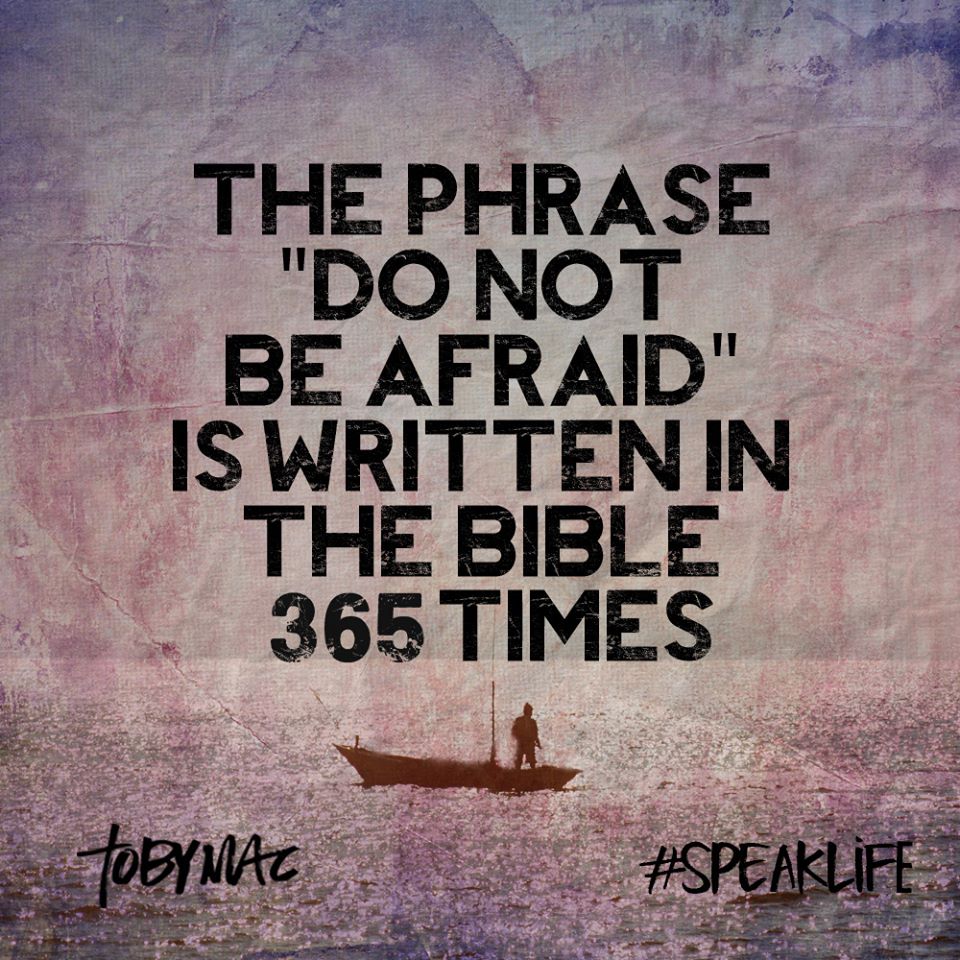 God of all the nations)”—to Advent status.
God of all the nations)”—to Advent status. Sheriff, police chief, mayor, FBI agent, school superintendent, hospital administration, all chiming in: awful, tragedy, distress, heartbreak, failure, regret, unimaginable.
Sheriff, police chief, mayor, FBI agent, school superintendent, hospital administration, all chiming in: awful, tragedy, distress, heartbreak, failure, regret, unimaginable. Too high a price, this “freedom”—there’s that word, of hallowed memories and hard fought struggle, the altar in our national cathedrals of patriotism, now officiating as pimp to politicians who know where the money comes from.
Too high a price, this “freedom”—there’s that word, of hallowed memories and hard fought struggle, the altar in our national cathedrals of patriotism, now officiating as pimp to politicians who know where the money comes from. called Armistice (or Remembrance) Day, marking the cessation of World War I hostilities on the 11th month of the 11th day at the 11th hour in 1918.
called Armistice (or Remembrance) Day, marking the cessation of World War I hostilities on the 11th month of the 11th day at the 11th hour in 1918. e US developed an even more effective chemical weapon, and sent a specialized chemical warfare unit to Europe; but the war’s end precluded their deployment.
e US developed an even more effective chemical weapon, and sent a specialized chemical warfare unit to Europe; but the war’s end precluded their deployment.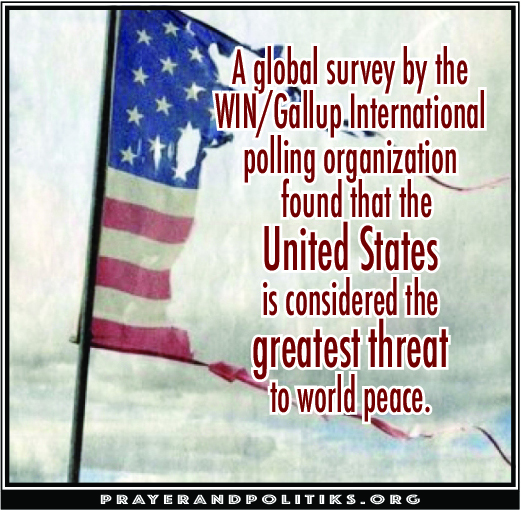 happens with bombardment and grave digging. The soil becomes acidic, choking most growth. But poppies thrive in such war-spoiled botanical conditions.
happens with bombardment and grave digging. The soil becomes acidic, choking most growth. But poppies thrive in such war-spoiled botanical conditions.